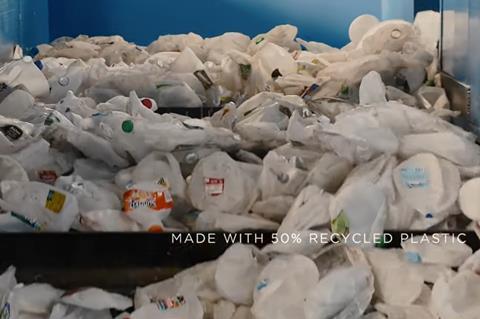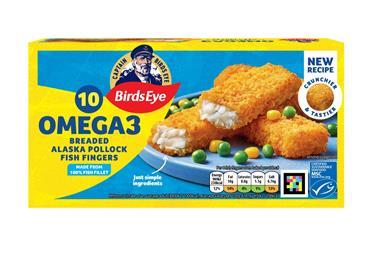
Persil has drawn the ire of the Advertising Standards Authority for making “misleading” sustainability claims.
The watchdog upheld a complaint against the Unilever-owned brand for making an unsubstantiated and “misleading” claim that its laundry detergents were “kinder to the planet” in a TV advert.
The ad depicted children collecting plastic litter from a beach as a voiceover stated: “For real change, we all need to roll up our sleeves and get dirty.”
“That’s why Persil deeply penetrates the fibres of clothes to remove tough stains the first time, even in a quick or cold wash and our bottles are made with recycled plastic,” the voiceover continued.
At the same time, the ad depicted clothes in a washing machine with on-screen text stating “removes stains at 30ºC” and “60 minutes quick wash”.
It showed a Persil bottle falling into water, followed by a moving conveyor belt filled with crushed plastic bottles, during which on-screen text stated “made with 50% recycled plastic”, with “*excludes cap & label” written in smaller font.
The voiceover went on to say: “Tough on stains, kinder to our planet. Dirt is good,” while children were depicted running through hanging white sheets in a field.
The ASA challenged whether the claim that Persil washing liquid was “kinder to our planet” was misleading and could be substantiated.
Persil argued that the ad began with a message that action was needed to effect change and reduce impact on the environment, and then showed how it continually improved its products to be kinder to the planet.
The ad focused on two specific features of their liquid detergents that made them kinder, it added. Firstly, they were proven to remove tough stains in cold washes. Secondly, the bottles now contained at least 50% post-consumer recycled plastic (PCR).
These initiatives were part of a wider Clean Future programme by Unilever, launched in 2020, which aimed to eliminate fossil fuels and ensure net zero carbon emissions in cleaning products by 2030, it said.
As part of that programme, its liquid detergents had been formulated with lower dose volumes and higher concentrations, and dosing balls had been removed, which had significantly reduced its use of plastic.
Persil argued the scene showing children collecting plastic waste was a visual reference to Unilever’s Dirt is Good project, which aimed to engage and inspire children aged six-13 to consider climate issues and care for the environment.
Ad preapproval organisation Clearcast argued the product benefits were set clearly within the context of Persil’s own development in the ad, and therefore the basis for the environmental claim was fully justified.
Despite this, the ASA upheld the complaint against Persil on the basis that the BCAP Code required that the basis of environmental claims must be clear.
It considered the comparative claim “kinder” was likely to be ambiguous to viewers. Additionally, in the absence of evidence demonstrating that the full life-cycle of the product had a lesser environmental impact compared to a previous formulation, it concluded the ad was likely to mislead viewers.
A spokewoman for Unilever told The Grocer it was “disappointed with the ASA adjudication as this TV advertisement was intended to communicate how Persil removes tough stains in quick and cold washes as well as how all Persil liquid detergent bottles now contain at least 50% recycled plastic”.
“We are committed to making on-going improvements to all our products to make them more sustainable and will continue to look at how we can share this with our shoppers,” she said.
Andrew Terry, partner at technology and media-focused law firm Harbottle & Lewis said Persil “needed to be specific” about what its “kinder to the planet” claim meant, “including whether that claim was in comparison to its own products, or its competitors’”.
“Persil did not make clear the ways in which their product was kinder than other products,” he said.
“Persil also failed to provide evidence about the environmental impact of the product based on its full life-cycle, and how that compared with previous formulations.”
“Although not always straightforward to quantify, assessing the full life-cycle of a product” was “a cornerstone of the ASA’s approach to environmental claims”, said Terry.
This decision continued the ASA’s “robust approach to environmental claims”, he said, adding that it remained “focussed on any perception of greenwashing in advertising”, and applied “a strict approach to its analysis”.
This meant brands needed to be “extremely careful about deploying generalised green terms in advertising, and instead have an absolutely laser-like focus on the specific product, and its full life-cycle.”
It comes after the ASA launched a series of inquiries into specific issues around environmental claims made in adverts late last year.
Persil isn’t the only brand to have since been given a slap on the wrist: in February, the watchdog ruled that Innocent had “misled” shoppers by suggesting buying its drinks could have a positive impact on the environment.



















No comments yet